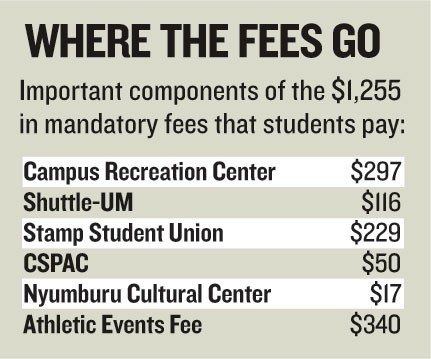
Recent research from the university’s Office of Budget and Fiscal Analysis found students are often forced to pay more for university services than faculty and staff, a disparity not present at peer institutions.
Each year, all students pay a single mandatory activities fee that includes payment for different university services. Faculty and staff, on the other hand, choose which facilities and services to pay for. They often pay significantly less for many of the same services or don’t have to pay at all, said John Blair, director of the Office of Budget and Fiscal Analysis.
“We have to think about equity,” said university President Dan Mote. “We should see who’s using these services and see if the revenue is being fairly distributed.”
This year, students paid $297 to use the Campus Recreation Center while faculty paid $162 for the same service, Blair said. Students also paid $116 to use Shuttle-UM and $229 for Stamp Student Union, but faculty and staff don’t have to pay for those facilities at all.
Other components of the activities fee include a $50 charge for the Clarice Smith Performing Arts Center, a $17 charge for the Nyumburu Cultural Center and a $340 charge to attend athletic events. Faculty and staff receive discounted tickets and only pay for events they wish to attend.
Faculty and staff pay more for parking but often have more choice as to where they park and receive better parking spaces depending on availability, Blair said.
Mote prompted the University Senate to examine the gap between student and faculty fees in a May address. Blair will report background information about fees to the senate’s Campus Affairs Committee next week. The committee will make a recommendation to the senate by February, which will in turn advise the Board of Regents’ committee for review of student fees, which sets the activities fee each year.
Budget officials at peer institutions said students and faculty paid similar amounts for services at their universities, but faculty could choose which services they used while student fees were mandatory.
John Adams, the director of financial planning and budgets at the University of North Carolina at Chapel Hill, said students pay the same amount as faculty to use the university’s gym and student union.
“We have an extensive review process of all fees,” Adams said. “Most of the student activity fees were established in the first place by the student congress.”
“For recreational facilities, faculty and staff pay a membership rate that almost equates to what students pay,” Associate Budget Director at the University of Virginia Melissa Clarke said. “I would say it is equitable.”
Concerns about inequity at the University of Maryland are exacerbated because the student activities fee has more than doubled in the past decade. Ten years ago, students paid only $615. Five years ago, the cost had risen to $964, and this year students paid $1,255. Blair said the fee rises an average of 5 percent each year, mostly because of inflation. At some peer universities, however, the activities fee has remained almost stagnant for the past fifteen years.
Assistant Vice Chancellor of Academic Planning and Budget at the University of California, Los Angeles Glynn Davies said the activities fee at that university had not seen a rise in fifteen years, but that it had risen $22 this year. Institutional Research Analyst at the University of Michigan Susannah Livingood said the activities fee there had “stayed the same for a long time.” Adams said, however, the activities fee at the University of North Carolina tends to rise each year.
Campus Affairs Committee members said rapid increases in student fees could be curbed by increased revenue if the senate decides faculty fees need to be raised.
Criminology and criminal justice professor Charles Wellford, the Campus Affairs Committee chairman, said the gap between student and faculty fees was mostly a result of historical precedent.
“They set the fee schedule for the [Campus Recreation Center] before my time,” Blair said. “It’s just been the same since then.”
Contact reporter Megha Rajagopalan at rajagopalandbk@gmail.com.



